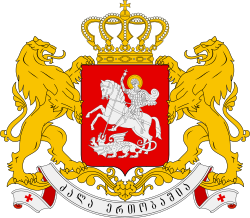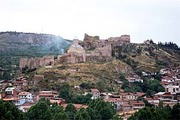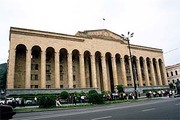Main facts about Georgia
Official Name:
Georgia | საქართველო - Sakartvelo
Capital:
Tbilisi
Date of Formation:
On 9 April 1991, shortly before the collapse of the Soviet Union, the Supreme Council of Georgia declared independence after a referendum held on 31 March 1991. On 26 May 1991, Zviad Gamsakhurdia was elected as the first President of independent Georgia. Gamsakhurdia stoked Georgian nationalism and vowed to assert Tbilisi's authority over regions such as Abkhazia and South Ossetia that had been classified as autonomous oblasts under the Soviet Union.
 The Flag:
The Flag:
The flag of Georgia (Georgian: საქართველოს სახელმწიფო დროშა; Sakartvelos sakhelmts’ipo drosha), also known as the Five Cross Flag (Georgian: ხუთჯვრიანი დროშა, romanized: khutjvriani drosha), is one of the national symbols of Georgia. Originally a banner of the medieval Kingdom of Georgia, it was repopularized in the late 20th and early 21st centuries during the Georgian national revival.
 The Coat of Arms:
The Coat of Arms:
The coat of arms of Georgia is one of the national symbols of the republic. It is partially based on the medieval arms of the Georgian royal house and features Saint George, the traditional patron saint of Georgia. In addition to St. George, the original proposal included additional heraldic elements found on the royal seal, such as the seamless robe of Jesus, but this was deemed excessively religious and was not incorporated into the final version
The Anthem:
"Tavisupleba" - Freedom.
"Dideba" was used as the Georgian national anthem from November 1990until 20 May 2004, when it was replaced by the current Georgian national anthem "Tavisupleba" following a change in governments.Though the replacement of "Dideba" in 2004 came after a change in governments, preliminary efforts to replace "Dideba" reportedly predated said reforms.
State Organization:
Georgia is a representative democratic parliamentary republic, with the President as the ceremonial head of state, and Prime Minister as the head of government. The executive branch of power is made up of the Cabinet of Georgia. The Cabinet is composed of ministers, headed by the Prime Minister, and appointed by the Parliament.
The Constitution:
The Constitution of Georgia (Georgian: საქართველოს კონსტიტუცია, sakartvelos k'onstitutsia) is the supreme law of Georgia. It was approved by the Parliament of Georgia on 24 August 1995 and entered into force on 17 October 1995. The Constitution replaced the Decree on State Power of November 1992 which had functioned as an interim basic law following the dissolution of the Soviet Union.adopted on July 5, 1995, through a popular referendum.
Read more about the general information about Georgia HERE
Media:
The mass media in Georgia refers to mass media outlets based in the Republic of Georgia. Television, magazines, and newspapers are all operated by both state-owned and for-profit corporations which depend on advertising, subscription, and other sales-related revenues. The Constitution of Georgia guarantees freedom of speech. Georgia is the only country in its immediate neighborhood where the press is not deemed unfree.
As a country in transition, the Georgian media system is under transformation. The media environment of Georgia remains the freest and most diverse in the South Caucasus, despite the long-term politicisation and polarisation affecting the sector. The political struggle for control over the public broadcaster left it without a direction in 2014.
A large percentage of Georgian households have a television, and most have at least one radio. Most of Georgia's media companies are headquartered in its capital and largest city, Tbilisi.
Read more about the Media and Censorship in Georgia HERE
 Greater Caucasus Range
Greater Caucasus Range Old Tbilisi
Old Tbilisi Georgian Parliament
Georgian Parliament Georgian children from Svaneti
Georgian children from Svaneti
